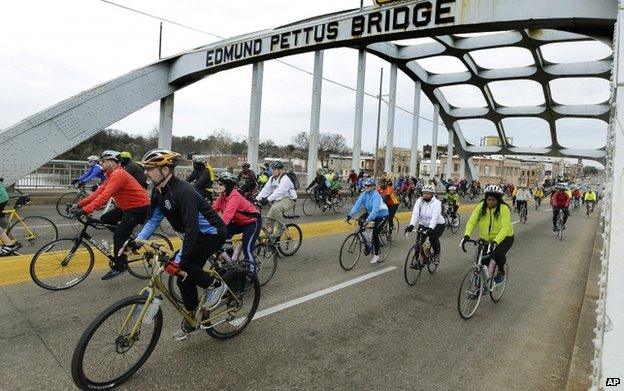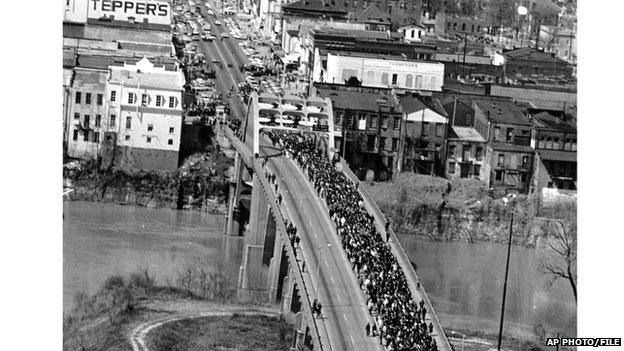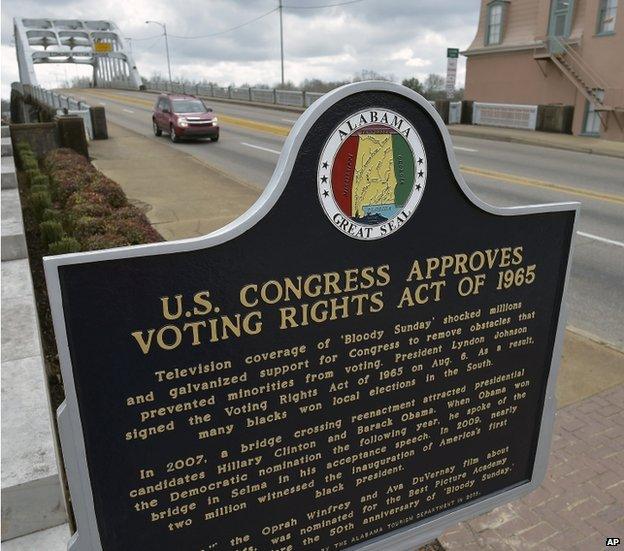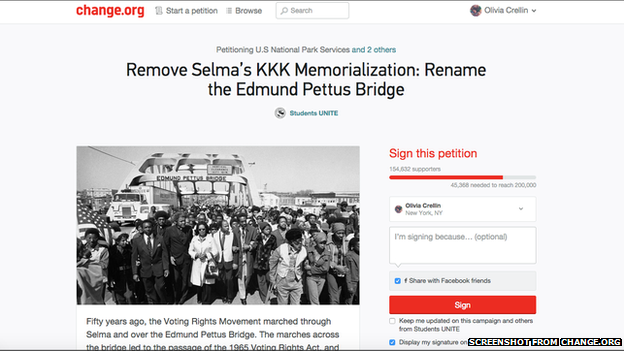Selma bridge and the battle over its 'KKK name'
- Published

US President Barack Obama will visit Selma, Alabama to commemorate the 50th anniversary of "Bloody Sunday".
That's how historians refer to the violent clash between protestors and police when civil rights activists tried to cross the Edmund Pettus Bridge as part of their walk from Selma to Montgomery to protest for voting rights.
The clash was important, leading to the passing of the 1965 Voting Rights Act.
But though the bridge has become an iconic symbol of civil rights, its name is now a modern source of contention.
One group has set up an online petition, external to change the name of the bridge, named after Edmund Pettus.
Not only was he a Civil War general and former Alabama senator, but Pettus also served as Grand Dragon of the Alabama Ku Klux Klan in the late 1800s.
It has gathered more than 150,000 signatures.
"The group got to talking about how offensive the name of the bridge is and how much of a disconnect having a KKK leader on the gateway of the bridge of Selma was," said John Gainey, executive director of the Students UNITE, external, which is a civil rights and advocacy organisation group for 16 to 25-year-olds.
"The bridge is not representative of the direction of where we want Selma to go in the future," he added.

Three marches in 1965 from Selma to Montgomery led to voting reform

Dave Eicher, author of "The Longest Night: A Military History of the Civil War," said Pettus was a Confederate General during the American Civil War who was indeed appointed as the Alabama KKK leader in 1877.
He described the post-war activities of Pettus as "deplorable" and said that even as US Senator for Alabama, he was "pushing for the Old South" and "attempting to preserve the southern system of slavery".
Supporters of the petition believe his name should not be on the bridge.
"I'm signing because I believe the bridge's name should represent what it stands for, not what it stands against," wrote one supporter of the petition, Jessica Allen, from Selma.
Aleem Maqbool sets off on the journey from Selma to Montgomery
Charles Clark even had a suggestion for a new name. "I think it should be changed. It's everyone's bridge. Name it the "Bridge to Freedom," he wrote.
The petition - addressed to the US National Park Services, Alabama Governor Robert J Bentley and the Mayor of Selma, George Patrick Evans - gathered 1,000 signatures in the first 24 hours.
The petition's authors point out online that Selma is currently 80% African American, with a black mayor and a majority of African American city officials.
Yet despite the demographics of the city, the petition does not have the support of many of its residents, including the first African American to be elected as Selma mayor in 2000.

The online petition begun by local youth advocacy group Students UNITE got 1,000 signatures in the first 24 hours
"It represents the contradiction between America's past and what the Constitution says and so if you change the name of the bridge you change the meaning of the bridge," James Perkins told local Alabama news site Al.com, external.
"That bridge doesn't just connect Selma to the Selma march, it connects our past to our present; it connects our present to our future. Every now and then when you build a monument, it's good to leave it where it is to remind you from whence you come and where you need to go."
But Gainey, whose group started the petition to get the bridge renamed, said the campaign is not trying to erase the past.
"We are not trying to forget history, and even if we were there is no way we could," he said.
Blog by Olivia Crellin
Next story: The online joke is on Islamic State
Or maybe you'd like to watch: Coming out as gay at Chinese New Year
You can follow BBC Trending on Twitter @BBCtrending, external, and find us on Facebook, external. All our stories are at bbc.com/trending.